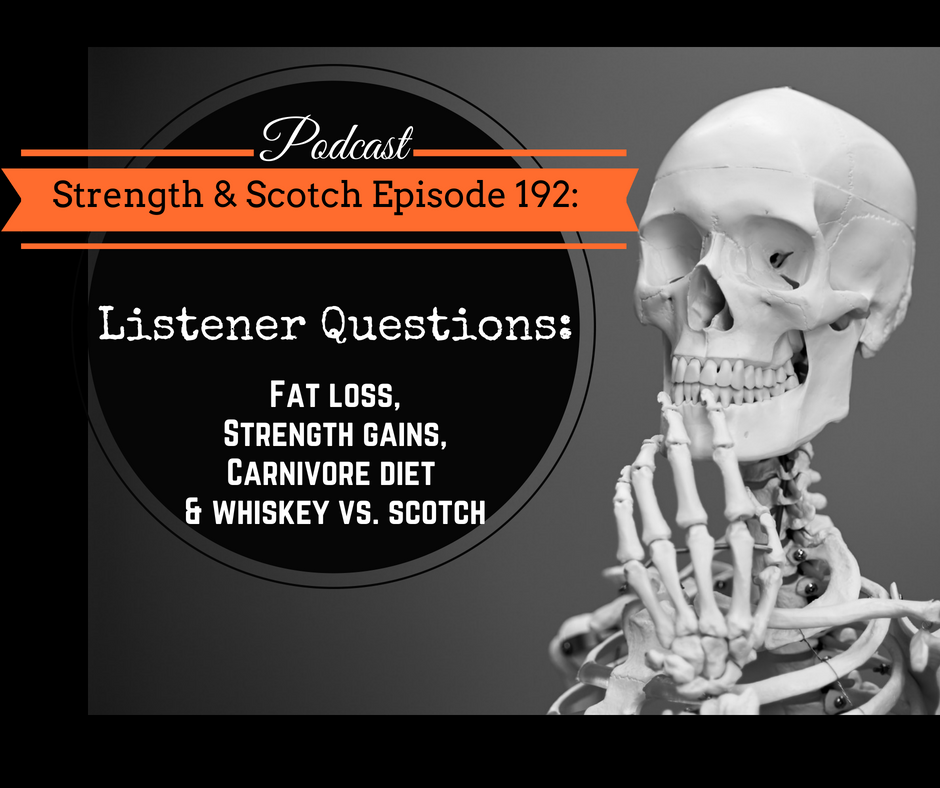SS 192 – Listener Questions: Fat loss, Strength Gains, Carnivore Diet & Whiskey vs. Scotch
Episode 192 Show Notes
Grant and Heavey address a series of questions from podcast listeners, covering topics such as intermittent fasting, reverse dieting, carnivore diet, and some scotch recommendations for beginners.
Do you have any questions you want answered here on this podcast? Email Grant at [email protected] and Heavey at [email protected] or drop your question over at strengthandscotch.com.
[02:45] Gaining Strength While Losing Weight
Question: Is it possible for you to still get stronger from training while losing weight?
Answer: Listen to Episode 138, where they tackle this topic. When you first start training, almost all of your strength gains come from neurological adaptations. As you become more and more proficient and advanced, that shifts a little bit. Though still important, you’re not almost exclusively getting stronger.
However, you can still increase your neurological adaptations when you’re on a big caloric deficit. Just make sure you’re not compromising your ability to have those types of strength gains. For example, when you diet too hard, you may feel your motivation to train decrease. You may also feel your ability to push hard in the gym drop as well.
If you do notice that, that’s the body’s feedback loop and it’s probably too much. Consider laying off or modifying your diet in some way.
[06:18] Gaining Muscle Mass While Losing Fat
You can gain muscle mass and lose fat at the same time. This is done in two ways. First, continue to lift heavy. Second, make sure you’re getting adequate protein. This is about 1g of protein per pound of body weight. Hence, if you’re doing these two things and you’re not feeling like your ability to push hard in the gym is compromised, then this is fine. You may not be able to lift the absolute maximum amount of weight you could, but you should still be able to put on muscle and improve body composition.
Grant raises a valid question as to why skinny people with less muscle mass tend to be stronger than those with big muscles. Heavey explains that they might have a stronger capacity to recruit muscle tissue.
[08:10] Intermittent Fasting
Question: Tim is 24 years old and recently lost 30 pounds going from 265 to 235, using intermittent fasting which worked awesome for his lifestyle. He fasts for 18 hours and has a 6-hour eating window. It has helped him consume a lot less calories but he’s worried he might be eating too little now, for a 6’1″ guy who benches 365, squats 405, and deadlifts 455. He’s eating around 2300 calories a day and has been losing around 3-4 pounds per week. Tim is asking how many calories should he be eating a day having a body fat of 20%. He lifts 5 days a week and does HIIT for 15 minutes after a 60-minute lifting session.
Answer: One of the benefits of many people from intermittent fasting is fat loss. In general, it helps people eat less than if they would if they just tried reducing the number of calories they’re consuming at three meals throughout the day. 2-3 pounds would be a lot to lose each week. An average would be one pound a week but it varies depending on your body weight. Tim at 235 is a reasonable percentage of his body weight. In general, we would like to see a sustainable weight loss at 1% per week, and that would be over one pound. But if you’re feeling good and your goal is to continue to lose fat, then you’re doing great. Therefore, there’s no reason to adjust it.
Additionally, make sure your sleep doesn’t get disrupted due to the reduced calories you’re having now and that your energy levels are not dropping off the map. If you feel shitty, then ramp up your calories a bit because it’s usually at the higher end of a weekly weight loss.
[13:19] Reverse Dieting
There will be a time for Tim after he has achieved his goals with fat loss to back his way out of it and see what happens. Heavey mentions a study where dieters ate at 90-95% of their BMR over a period of two years. Their BMP was adjusted over such a period but they kept adjusting their diets too. Those people lost a considerable amount of weight over that period.
The natural thing that’s going to happen to Tim is seeing his weight loss rate taper off as he gets leaner. With his present numbers right now, it’s unlikely for him to continue to keep losing 4 pounds a week for another six months.
[16:55] Scotch Recommendations (From Thy Masters)
Question: I’ve always been a whiskey and bourbon kind of guy. I just started exploring scotch and all I’ve tried is Johnny Walker Red Label. Any other recommendations?
Answer: Bourbon is whiskey. Scotch is whiskey. Grant says there’s literally no where to go but up from there. He drink and recommends Johnny Walker, but Red Label is not as good. More often, people use it for cocktails mix.
Heavey recalls going to a Johnny Walker vertical tasting promotional event. They’d give you some of every label and in the Red Label portion, they’re asked what to mix it with. With that said, Grant mentions there are a few main scotch-producing areas in Scotland and each has their own style and signature.
One example is a Glenlivet 12 years old, this is your entry run-of-the-mill well-executed, basic single malt scotch. It’s one of the best selling single malts in the world. It’s easy to drink and you can easily see why people get into scotch by drinking that.
Then to understand the world of scotch, you’ve got to try peat. Laphroaig 10 is the quintessential item but it’s starting to be stronger. After tasting it, you may find it too much or too smokey. Put it aside for six months and then come back to it and you might fall in love with it.
A more expensive bottle that has a signature peat and a little easier to drink, which Grant highly recommends, is Coalila. Most of the products they produce go to Johnny Walker for their Black and Double Black Labels. This one’s got a peat that’s not so overpowering. If you find you like peat, there’s a whole other world out there.
Lastly, Grant recommends a type of scotch that’s aged or finished in a sherry cask. People look for these things called Sherry Bombs which changes the mouth fill and the body. The flavor of the scotch becomes much more full, rich, and sweet. It almost tastes like a completely different alcohol despite the fact that it’s the same spirit, just aged in a different barrel. 90% of scotches that aren’t finished and aged in sherry are aged in ex bourbon casks. Grant finds it funny because it’s going to be more like bourbon if it’s aged in sherry casks than the ones aged in bourbon barrels.
This is what’s interesting with scotch is that you start to get into the regions and the different ways they age, the barrels, and location. All of this just creates an entire world to explore.
[23:18] The Carnivore Diet
Question: Jordan listened to another podcast that talked about Dr. Shawn Baker’s all meat diet, or the carnivore diet.
Answer: This diet involves eating only beef. However, Heavey hasn’t fully investigated this. Dr. Baker is a former MD, who is around 50 years old and looks totally shredded. Heavey points out that any time you have one of these diets where it’s just doing one thing especially because it’s demonized by a lot of other people, it gets a lot of attention.
Dr. Baker’s claim is that you should only be eating meat and claims we’ve been lied to as a public about the benefits of eating fruits and veggies. Heavey says this might be believable in a lot of ways considering all the misinformation going on right now. We’ve been lied to about fats, cholesterol and all these other pieces. Dr. Baker does have some scientific approach to his claims, doing all his own research and showing studies that support his claim. That being said, Heavey doesn’t agree with any dietary approach that’s exclusionary. The same reasons he doesn’t think vegan or vegetarian are good choices. Because every time you do a wholesale removal of large portions of our normal diet, you’re going to miss out on key vitamins and nutrients.
Everything we’ve read on the inclusion of fruits and vegetables shows almost no negative research that you can find. There have been some randomized controlled trials on some fruits and vegetables and we’ve seen that they affect blood markers in a positive way. Berries, for instance, have been shown to reduce LDL, blood pressure, fasting glucose.
All this being said, through his extensive reading of research, Heavey sees a strong place in the human diet for fruits and vegetables and meat. All of them should; therefore, be included.
Links:
SS 138: Can You Build Muscle and Lose Fat at the Same Time?

Check out the gear page for everything Strength & Scotch! You’ll find a listing of all the supplements and other programs we’ve discussed on the show as well as our killer t-shirts!

